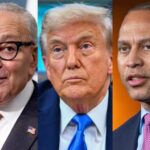Rand Paul Denounces Trump’s Tariffs on Brazil as Poorly Executed
Senator Rand Paul has voiced strong opposition to the Trump governance’s recent imposition of tariffs on Brazilian imports, labeling the decision as improvised and lacking strategic depth. The tariffs, introduced amid the ongoing legal proceedings against former Brazilian President Jair Bolsonaro, aim to exert pressure on Brazil but, according to Paul, overlook the broader economic ramifications.He warns that such unilateral actions threaten to disrupt essential trade ties and impose unnecessary costs on American companies dependent on Brazilian products.
Paul criticized the process behind the tariff rollout, highlighting a lack of comprehensive consultation and foresight regarding long-term effects. He expressed apprehension about possible retaliatory tariffs from Brazil and the subsequent impact on U.S. consumers through increased prices. Below is a concise overview of Paul’s main arguments against the tariff policy:
- Economic Consequences: Threats to U.S. manufacturers and consumer affordability.
- Diplomatic Risks: Heightened tensions with a key trading partner.
- Policy Deficiencies: Absence of thorough planning and stakeholder engagement.
- Political Effectiveness: Doubts about influencing foreign judicial matters through tariffs.
| Focus Area | Potential Challenge | Paul’s Viewpoint |
|---|---|---|
| Trade Relations | Risk of Brazilian retaliation | Advocates for diplomatic caution |
| Consumer Impact | Rising import costs | Warns against burdening consumers |
| Policy Formulation | Reactive decision-making | Calls for strategic planning |
Evaluating the Economic and Trade Fallout from Brazil Tariffs
The Trump administration’s recent tariff imposition on Brazilian goods, linked to the political turmoil surrounding Jair Bolsonaro’s trial, has ignited widespread debate over its economic and diplomatic consequences.Critics argue that conflating judicial matters with trade policy undermines the stability of a historically robust economic partnership between the U.S. and Brazil. The tariffs, enacted without extensive stakeholder engagement, have been described as “improvised” by several U.S. policymakers who caution against unintended ripple effects beyond the immediate political context.
Economic experts highlight several potential repercussions:
- Cost Inflation: U.S. manufacturers dependent on Brazilian raw materials may face higher import expenses, which could translate into increased prices for consumers.
- Retaliatory Measures: Brazil might respond with counter-tariffs,potentially escalating into a damaging trade dispute.
- Investment Volatility: Sudden policy shifts can deter foreign investment and slow bilateral economic growth.
| Trade Dimension | Before Tariffs | Forecast After Tariffs |
|---|---|---|
| U.S. Imports from Brazil | Approximately $30 billion annually | Projected 10-15% reduction |
| Brazilian Exports to U.S. | Consistent growth trend | Potential volatility with recession risks |
| U.S. Consumer Prices | Moderate inflation levels | Expected upward pressure |
Broader Consequences for Bolsonaro Trial and U.S.-Brazil Diplomatic Relations
The imposition of tariffs on Brazil during the ongoing Bolsonaro trial has stirred significant controversy,exposing fractures within U.S.political circles over the coherence of trade and foreign policy. Critics argue that this tactic lacks strategic depth and risks damaging diplomatic channels essential for managing sensitive international legal matters. Senator Rand Paul notably described the tariffs as “improvised,” warning that such economic pressure could intensify tensions, complicating both judicial proceedings and bilateral negotiations by fostering animosity rather than collaboration.
Primary concerns include:
- Possibility of retaliatory trade actions by Brazil, escalating economic conflict.
- Harm to long-established U.S.-Brazil diplomatic ties critical for regional stability.
- Potential undermining of the Bolsonaro trial’s legitimacy by mixing legal issues with economic coercion.
| Dimension | Possible Outcomes |
|---|---|
| Trade Relations | Disrupted import/export flows, higher consumer costs |
| Diplomatic Trust | Reduced cooperation on regional security and environmental issues |
| Judicial Process | Increased polarization, challenges to fair trial perception |
As the U.S. navigates this intricate scenario,the intersection of economic policy and judicial affairs underscores a delicate balancing act: safeguarding national interests while respecting foreign sovereignty and legal processes. The long-term impact of this tariff strategy on U.S. engagement in Latin America remains uncertain, but current critiques highlight the necessity for more measured, diplomatic solutions rather than reactive economic sanctions.
Strategies for Enhanced Trade Policy and Diplomatic Resolution
In an era marked by escalating trade frictions, it is indeed imperative for policymakers to adopt measured, data-driven approaches rather than resorting to abrupt tariff impositions. Creating robust multilateral frameworks for dispute resolution can definitely help mitigate misunderstandings and promote constructive dialog. Such mechanisms not only preserve diplomatic goodwill but also reduce economic disruptions for industries integrated into global supply chains. Furthermore, utilizing advanced analytics to anticipate the effects of trade measures can prevent unintended fallout, ensuring policies are both effective and sustainable.
Effective engagement should also involve inclusive consultations with a broad spectrum of stakeholders, including business leaders, labor unions, and foreign diplomats, to identify common ground and negotiate compromises early in the process. The table below outlines a streamlined framework for a more strategic approach to resolving trade disputes:
| Element | Description | Advantage |
|---|---|---|
| Transparent Interaction | Timely and open exchange of data among parties | Minimizes misunderstandings and builds trust |
| Multilateral Engagement | Participation in international trade organizations and forums | Enhances diplomatic influence and legitimacy |
| Economic Impact Analysis | Data-informed evaluation of trade policy consequences | Prevents collateral economic damage |
| Stakeholder Involvement | Inclusive dialogue with affected industries and communities | Fosters consensus and policy acceptance |
Concluding Reflections on Trade Policy and U.S.-Brazil Relations
As debates over U.S.trade strategy intensify, Senator Rand Paul’s critique of the Trump administration’s tariff imposition on Brazil highlights mounting concerns about the coherence and strategic soundness of such policies. With tensions escalating between Washington and Brasília amid the Bolsonaro trial, the trajectory of bilateral trade relations remains uncertain. Stakeholders and observers alike will be closely monitoring whether future policy decisions can balance economic interests with diplomatic prudence, avoiding further exacerbation of economic and political strains.









